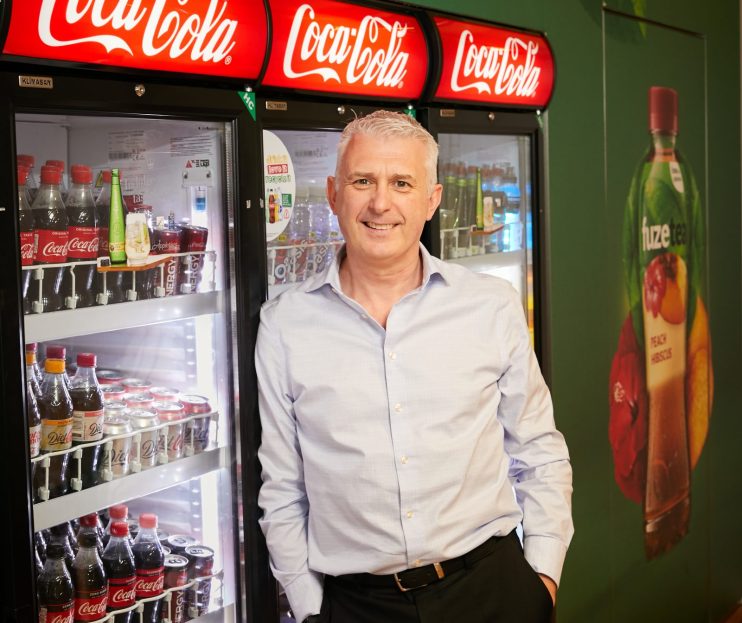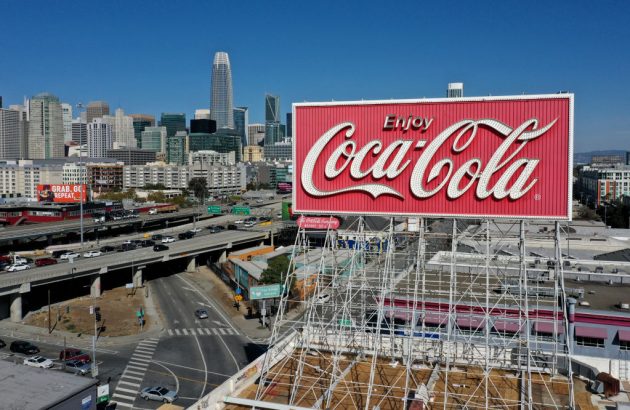Coke UK CEO: Our sugar-free variants are thriving – but the full-fat Coca-Cola is safe

Earlier this month, thanks to the strange vagaries of the internet, a years-old video emerged of the now-Chancellor Rishi Sunak expressing an opinion that – at the highest levels of a Government hell-bent on public health warnings – now seems almost scandalous.
“I’m a total Coke addict,” he tells two schoolchildren. “A Coca-Cola addict.”
The politically astute Sunak scrambles to get out of his self-dug hole. “I got through a lot of the stuff when I was young, which is very bad, so people should not… don’t do that.”
More, inexplicably: “But I now have one a week. I’m only allowed one a week now. So I’m an enormous Coca-Cola fan.”
So the Chancellor – now, mercifully for us all, a more fluent politician – will be relieved to hear Coca-Cola’s GB CEO Jon Woods tell me that there are no plans for a future without old-school, full-fat coke despite the success of sugar-free variants.
Read more: Energy firms refusing to supply pubs during pandemic, trade body says
“I don’t see it. Maybe you see it, but I don’t see it. I’ve got regular coke in my fridge downstairs, and Coke Zero, and Diet Coke Caffeine-Free, and there’s an occasion for each of them,” he says from his home office near Oxford.
“I think the proportion of Coke sales which are in regular cola will continue to decline, as they have been in reality for 35 years, because 35 years ago we launched Diet Coke.”
Over that period, of course, Coca-Cola has not just remained the world’s most recognisable drink, but become a drink industry behemoth too.
In GB, Woods oversees an empire which encompasses – deep breath – Coca-Cola, Diet Coke, Coke Zero, Coca-Cola Energy, Costa’s tinned coffee range, Lilt, Fanta, Sprite, Glaceau Smartwater, VitaminWater, Oasis, Powerade, Schweppes, Coca-Cola’s signature mixers and even Innocent Smoothies, though that is essentially run as a separate business. A whole host of other brightly coloured concoctions which adorn the wall of every convenience store and supermarket in the land finish out the portfolio, which even now includes an alcoholic hard seltzer.
Jon, then, is a busy man.
Sweating the small stuff
Nobody was immune from the disruption caused by Covid-19, and even global companies like Coca-Cola were dramatically affected.
“About fifty per cent of our business goes through the main supermarket chains in a normal year, and then 25 per cent through all of the other retail outlets that you can imagine,” he says.
“And then pubs, bars, cafes and restaurants account for a quarter of the business. So during 2020, we’ve had quite an extended period of time when effectively a quarter of our customers have been closed, and that creates clearly quite a lot of significant change in the business.”
Coke’s efforts during the pandemic have been focussed on ensuring their retail businesses are fully stocked, with sales staff available to customers and – after a brief hiatus – marketing spend back to something like normal.
Now their eyes are turning to the recovery, with a staggered loosening of restrictions from April through to June likely to see hospitality businesses emerge, blinking, into the sunlight.
“Generally, those businesses are owned by an individual man or woman who are running a business that’s their life and livelihood. And those outlets survive because they’re different, they’re unique, they’re special,” he says.
“They’re the kind of signature outlets that you might see on a town square or on the high street, and they’ve all been closed for a long period of time.”
The damage has been very real across the industry. Coca-Cola serve cafes and restaurants of course, but to take pubs and bars as one example, recent figures suggested 21 pubs a day closed permanently during the last year across the UK.
So Coca-Cola are throwing money into a new scheme which they say will give businesses a fighting chance.
“First of all it was about extending credit terms,” Woods says. Then the firm took out expiring stock – some of which went to charity – and replaced it with new when the first reopenings took place.
“Those are the kind of basic elements of good working relationships, and the sort of things that big companies should do to try and help smaller customers make it through,” he said.
Coca-Cola then donated some £3m of advertising space to smaller outlets, and are now launching a scheme which will see mentoring offered to a range of independent pubs, bars, cafes and restaurants which Woods says will help them thrive.
Coke will do work around footfall and merchandising, whereas Innocent will take the lead on innovation, sustainability and the customer experience.
Woods says he thinks it will genuinely help the outlets the firm is trialling the programme with, in the hope of rolling it out wider.
“And of course it’s good for coke. They’re good customers.”
Woods refutes the suggestion that those outlets weren’t a key part of the Coke mix before the pandemic, but says that the pressures of the pandemic have changed the firm’s modus operandi.
“We know it’s going to take something for them to get everybody back through the doors. The risk is that consumer behaviour has changed, and so we need to help them become better places for people to come and spend time and money,” he says.

Sugar burst
Woods was a vocal opponent of the UK Government’s sugar tax, and the firm famously took out adverts in the aftermath of its imposition to inform consumers Coke wouldn’t be changing its recipe – and would simply have to accept that it would sell at higher prices.
But regardless, more than half of all the ‘Coke’ sold in the UK – the full-fat variety, Diet Coke, and Coke Zero chief amongst them – contains no sugar at all.
Is that the sugar tax’s doing? Has the policy worked to reduce sugar in the nation’s diet?
“I think people’s awareness of too much sugar, salt and fat is growing,” Woods says, diplomatically.
Historically, “the soft drinks industry has done a pretty good job in growing the lighter side of the soft drinks business,” he tells us.
“Today the average Brit gets seven per cent of their added sugar from soft drinks, and if you turn the clock back five years ago that was about twelve per cent.”
He’s keen not to credit the sugar tax alone with the shift – and the numbers, to be fair, bear him out.
“I think the other things that have made an impact are the distribution of zero variants. Particularly if I took Coke Zero distribution and availability,” he says, “it’s gone up massively over the last few years and that’s really driven a big change.”
Coke now spend all of their sizable marketing spend on their sugar-free options, and over the past year the trend towards those alternatives has only increased.
All in all, he says, it adds up to a “pretty successful approach to trying to reduce sugar in soft drinks” – with a slight hint in his voice indicating he knows it’s not always results that drive government policy.
Read more: UK sticks by open derivatives trading stance despite EU ban
Innovating at pace
Woods launched his first alcoholic drink last year – a hard seltzer.
He says it’s an example of a firm “wanting to find opportunities to grow, and being willing to experiment.”
A Jack and Coke can, then? “No, but you never know. Anything can happen!”
In fact, mixers have been one of the pandemic winners – the fastest growing part of Coke’s portfolio.
“That reflects, clearly, a change in consumer behaviour. There comes a moment in the day or in the week, when a gin and tonic becomes quite attractive.”
We all know that feeling this year.